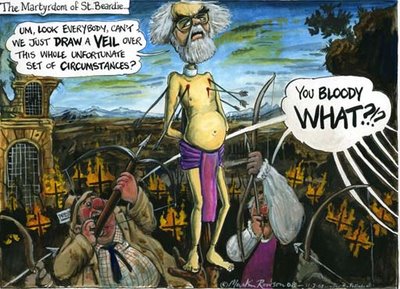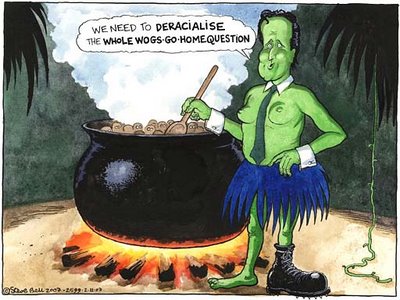Analysing throw away comments too deeply.
Via Pickled Politics, Martin O'Neill has some harsh words for the BBC 2 documentary, part of the "White" season, which dealt with Enoch Powell's Rivers of Blood. Further discussion is on Crooked Timber, but this comment on O'Neill's post is simply too good to be true:
You could just laugh and leave it at that. After all, all of those nations have just as big, if not larger immigrant populations than Blighty, and those leaving to go and live in any of the major cities in those countries are unlikely to find life that different as it is to here. It's notable that he's missed out Spain, which has one of the largest British ex-pat populations, but has also been one of the main centres for immigration, far more so than we have been. That a good number of those who then go out and live in those countries do nothing whatsoever to integrate themselves, but still feel the need to pop up on UK newspaper websites decrying the immigration situation or the latest political correctness madness is also always amusing. There are of course exceptions to that rule: the Grauniad ran an article last week about British ex-pats running for office in rural France and horror of horrors, conversing in French while campaigning.
theone's point though isn't quite the non sequitur it looks at first glance however. You shouldn't perhaps read too much into a possibly throwaway remark, but the choice of Australia, France and the USA as examples rather than Spain as previously mentioned is indicative of countries which are still seen as overwhelmingly white, whether that's actually true or not. theone and those he's describing don't want to get away from immigrants, but rather from those that aren't white. As Sunny has himself argued about the white season, just as many working-class brown families face the exact same problems, because the issue is not one of race but class. The poll conducted for the BBC to coincide with the season was interesting not because the white working classes felt they were ignored, which they certainly are by political parties of all varieties which are obsessed with the middle-classes and swing voters to such an extent that they are destroying the political system from within through the madness of the end of ideology and the rise of dog-whistle policies, but because 46% of the ABC1 group also thought no one spoke for them. The most pampered group in modern history, for whom nothing is too good, and still nearly half of them believes that no one speaks for them. If it wasn't so tragic, it'd almost be as funny as theone's comments.
Why are so many decent british/english leaving every month, every year to places like France, america, and australia? I tell you why and its because of all the foreigners.
You could just laugh and leave it at that. After all, all of those nations have just as big, if not larger immigrant populations than Blighty, and those leaving to go and live in any of the major cities in those countries are unlikely to find life that different as it is to here. It's notable that he's missed out Spain, which has one of the largest British ex-pat populations, but has also been one of the main centres for immigration, far more so than we have been. That a good number of those who then go out and live in those countries do nothing whatsoever to integrate themselves, but still feel the need to pop up on UK newspaper websites decrying the immigration situation or the latest political correctness madness is also always amusing. There are of course exceptions to that rule: the Grauniad ran an article last week about British ex-pats running for office in rural France and horror of horrors, conversing in French while campaigning.
theone's point though isn't quite the non sequitur it looks at first glance however. You shouldn't perhaps read too much into a possibly throwaway remark, but the choice of Australia, France and the USA as examples rather than Spain as previously mentioned is indicative of countries which are still seen as overwhelmingly white, whether that's actually true or not. theone and those he's describing don't want to get away from immigrants, but rather from those that aren't white. As Sunny has himself argued about the white season, just as many working-class brown families face the exact same problems, because the issue is not one of race but class. The poll conducted for the BBC to coincide with the season was interesting not because the white working classes felt they were ignored, which they certainly are by political parties of all varieties which are obsessed with the middle-classes and swing voters to such an extent that they are destroying the political system from within through the madness of the end of ideology and the rise of dog-whistle policies, but because 46% of the ABC1 group also thought no one spoke for them. The most pampered group in modern history, for whom nothing is too good, and still nearly half of them believes that no one speaks for them. If it wasn't so tragic, it'd almost be as funny as theone's comments.
Labels: BBC White season, Enoch Powell, immigration, johnny foreigner, Martin O'Neill, racism



